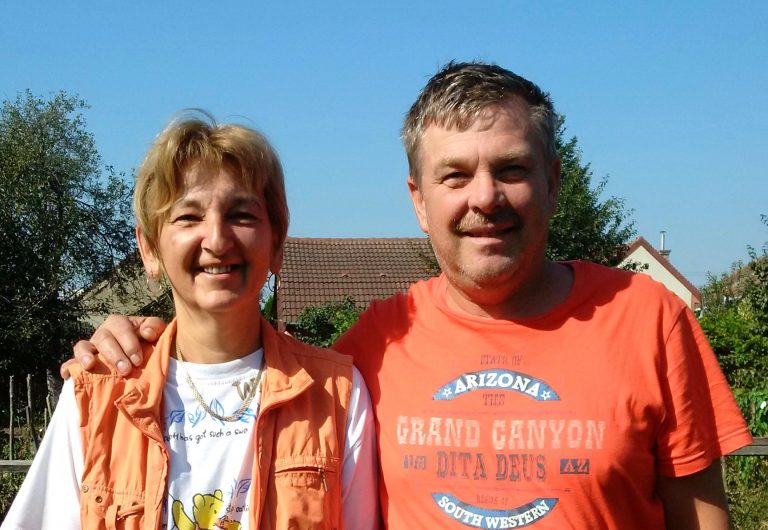Enike and Istvan run a CSA farm that provides many of our Ecoruralis hosts with their weekly box on a year-round basis. The essential aspects of shared risk and benefits are in place, as is the year-long commitment to their farm, even if payment is made on a weekly basis. This is not unusual in countries where family income is as low as it is in rural Romania. On our recent and final face-to-face Nyéléni Europe Coordination Committee meeting in Cluj, I had the extreme good fortune to stay at their home that is also an urban farm.
Here is their story, which is also the story of part of the food that will be feeding us during the Nyéléni Forum in Cluj at the end of October…
 Istvan comes from a farming family that reaches back many generations. His great-grand parents and grandparents bought or inherited and worked various plots of land in the Cluj region. With the advent of communism and the collectivisation of land under Ceausescu, their land was confiscated, and their houses bulldozed and destroyed. The families were allocated apartments in town. Istvan’s grandfather spent one night in the apartment, and managed to move back to live in a small house and work the land… True farmers do not take kindly to apartment blocks: they need the soil and the open skies! He continued to live in the small house with a garden, together with his mother, and later his wife, Eneke and their son. They had a horse as transport, a market garden, pig and hens. Today their modern house is built on part of the garden where the old barn used to stand, the horse and pigs are no longer possible,
Istvan comes from a farming family that reaches back many generations. His great-grand parents and grandparents bought or inherited and worked various plots of land in the Cluj region. With the advent of communism and the collectivisation of land under Ceausescu, their land was confiscated, and their houses bulldozed and destroyed. The families were allocated apartments in town. Istvan’s grandfather spent one night in the apartment, and managed to move back to live in a small house and work the land… True farmers do not take kindly to apartment blocks: they need the soil and the open skies! He continued to live in the small house with a garden, together with his mother, and later his wife, Eneke and their son. They had a horse as transport, a market garden, pig and hens. Today their modern house is built on part of the garden where the old barn used to stand, the horse and pigs are no longer possible,  but hens still lay wonderful eggs, and the garden behind their house is part of their urban farm. Most houses around Cluj still have significant gardens for subsistence reasons: people in rural Romania do largely grow most of their own fruit and vegetables and feed the wider family in this way.
but hens still lay wonderful eggs, and the garden behind their house is part of their urban farm. Most houses around Cluj still have significant gardens for subsistence reasons: people in rural Romania do largely grow most of their own fruit and vegetables and feed the wider family in this way. 
Following the downfall of Ceausescu, there was a general land reform, and the family managed to get back the different plots of land (several hectares in all). One of these plots is today used by Ecoruralis for growing vegetables for their seed-saving activities. Others are part of the production of the market garden activity and the CSA.
In a climate where winter lasts for 5 or 6 months, and the growing season is short, saving food for the long cold winter months is a challenge: carrots get stored in the cellar, onions in the attic, and traditional preserving is a ‘must’. Eneke has great traditional skills, also passed down from generation to generation: she makes copious quantities of tomato juice for the winter, barrels of pickled cabbage (sauerkraut) and pickled cucumber. She uses the old house on their urban farm to store vegetables, and as her ‘kitchen’ for all the preserves. She is well equipped, with an ancient but very efficient electric cabbage shredding machine (I remember my grandmother and mother and I used to spend several days every autumn doing this by hand!) and an extractor for the tomatoes. Seeing where and how the work is done reinforces how essential it is for health and safety legislation to be more adapted to small-scale food producers who also have some processing units. EU legislation as it stands could never apply here in what is a ‘back kitchen’, where the quality of the preserves is incredibly high, but the equipment far from the industrial sinks and surfaces and equipment required by EU law…
 The summer weather conditions this year were far from favourable. There was too much rain, as well as unexpected hailstorms that pockmarked the tomatoes and totally destroyed the onions and some of the potato crops. The rain did however favour the aubergines that are absolutely spectacular in size and appearance! The scent of the tomatoes and peppers wafts from the garden and the kitchen… And the flavour of the love and hard work will be part of the joys of eating our meals during the Nyéléni Forum!
The summer weather conditions this year were far from favourable. There was too much rain, as well as unexpected hailstorms that pockmarked the tomatoes and totally destroyed the onions and some of the potato crops. The rain did however favour the aubergines that are absolutely spectacular in size and appearance! The scent of the tomatoes and peppers wafts from the garden and the kitchen… And the flavour of the love and hard work will be part of the joys of eating our meals during the Nyéléni Forum!
Judith Hitchman, 3rd September 2016

